This post is featured on behalf of Jenna Brown.

We all have to deal with Murphy’s Law situations. You know, where if something can go wrong, it will go wrong. Additionally, these things tend to happen in threes and this means that nearly anyone’s budget could be stretched to the breaking point.
Anytime you have a financial emergency, it can be difficult. Sometimes things– like your air conditioner going out, having to fly home for a funeral, or losing a job can–send you on a mad scramble for money.
Many people have an emergency fund or even a credit card that they haven’t used and have been saving for a rainy day. However, that isn’t always the case.
In actuality, there are quite a few people who are now shunning things like credit cards so that they don’t get into financial trouble by using them. That might seem to make a lot of sense, but when an emergency arises, you might wish that you had one.
So, what do you do in a financial emergency instead? Here are six tips:
1. Use your emergency fund.
We always advocate that you should be putting money in savings for situations just like this one. Now is the time to tap into it if you have one.
If not, keep reading! And we urge you to start prioritizing emergency savings as soon as you can.
2. Remain positive.
There really isn’t a point to getting upset when you have an unexpected financial blow. It will not help matters if you stress yourself out. You need to remain calm, cool, and collected.
You will need to assess the entire situation and the damage that has occurred. Try to get an idea of what it will take to rectify the situation. If you don’t happen to have the funds on hand to cover the situation, think of how you can get it.
If you do have the money on hand but it was earmarked for something else, go ahead and take care of the emergency and deal with the fallout when you can.
3. Prioritize.
When you have a financial emergency, you will come to find that your funds can get tight with a quickness. A key to getting through the situation can be to prioritize what you spend. You need to ensure that you spend your money on the things you need first, such as shelter and food.
After those are taken care of you can think about transportation to your job and your utilities. If you have any debt, pay your secured debts first – things like car payments and house payments. Unsecured debt should come next – things like credit cards.
5. Cut your spending.
This should be a no-brainer. If you have had a financial emergency, the chances are good that you won’t have any extra money to spend. You need to cut down on your spending though not just until you recover from this emergency, but until you have an emergency fund in place for the next time something comes up.
This is where a good budget will come in handy. Using a budget can help you in prioritizing what you spend so that you will be better able to stop wasting your money on those things that are not a complete necessity. To be truly prepared, you can visit BasicFoodPrepper.com for emergency preparedness information.
5. Make extra money.
This happens to be probably the best thing that you can do when you need to pay off the expenses from an unexpected financial emergency.
It is also a good thing to do when you are trying to get yourself out of debt. Being able to earn extra money can accelerate the time it will take to pay your debts off.
This better enables you to be in a position to pay for any emergency expenses should any arise.
6. Ask for help.
You can also always ask for help from family members and or friends. Nobody likes to do this, but in an emergency situation, it might be one of your best options. Just be sure to pay them back as soon as possible so that you don’t put a strain on the relationship.
